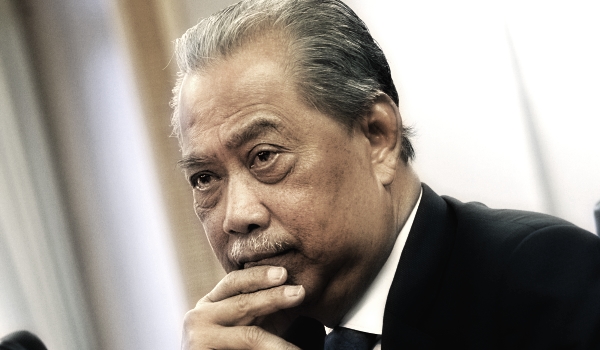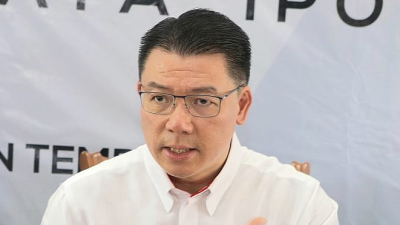By Tay Tian Yan, Sin Chew Daily
PM Muhyiddin is taking the biggest risk in his political career. He told the King he still had the support of majority of MPs, and would prove his claim in a confidence motion to be tabled in the parliament when it reconvenes next month.
Tabling a confidence motion is a battle of life or death for the PM. Is he trying to save or kill himself?
If the motion is passed, well, he can keep his post for the time being. And if it fails to pass, there is only one option left for him: to tender his resignation to His Majesty and dissolve his cabinet at the same time.
Muhyiddin's move has indeed taken many aback. In the past, the opposition have on several occasions wanted to table a no-confidence motion against him in the parliament but have been invariably blocked by his administration, including Takiyuddin Hassan's unexpected announcement in parliament last week of the revocation of the emergency ordinances, seen by many as an attempt to avoid a vote in parliament.
In fact, the survival of the PN government very much depends on how well it manages to avoid a head count in parliament.
Confidence vote and no-confidence vote are two opposing aspects of the same thing. In a democratically elected legislature, in particular the Westminster system, a no-confidence motion tabled by the opposition is often an extra-electoral operation meant to topple the sitting government. That being said, it is rather unusual, and often unnecessary, for a ruling party to table a confidence motion on its own accord.
This is especially when the position of a government is shaky and its numbers advantage dubious, then a confidence vote could be as good as a suicidal attempt, as the sitting government may lose its legitimacy to rule if the motion is rejected in the House.
Now that Muhyiddin has pledged to the King to table a confidence motion and has made a public announcement, there is no turning back for him. The confidence vote will now become a government agenda take shall take precedence among other government matters in the parliamentary sitting.
What makes the PM so confident of himself that he will have the support of more than 112 MPs?

On the surface, indeed he doesn't have the numbers now.
During the last parliament vote on the Budget eight months ago, it was 111 versus 108 in favor of the government.
And that was a very thin 3-seat margin when all Umno MPs voted "Yea" except Ku Li who was absent.
Over the following months, a couple of PH reps defected to PN. Preliminary estimates put PN's numbers at 115.
And now, with eight MPs from Umno (or 13 according to Ahmad Zahid), PN is left with only 102-107 seats and this doesn't give the PM an edge in the 220-seat parliament (minus two vacant seats).
The PH presidential council has even issued a statement that upon verification with various parties, it has been confirmed that PN now has indeed lost its majority.
Opposition parties have shown their cards. All the elected reps from PH, Pejuang, Warisan, PSB and anti-PN independents plus anti-Muhyiddin Umno reps put together already outnumber PN and PN-friendly MPs.
But, Muhyiddin might have his plans having the guts to face the no-confidence vote in parliament. There might be some changes that we may not yet see.
It is generally believed that Muhyiddin will do his utmost to try to rope in opposition MPs over the next one month, creating more party-hopping political frogs in a bid to turn the tide around.
Sure enough such a possibility does exist, but PN's carrot and stick strategies employed over the past one year plus should have brought him whoever that should, or would jump ship.
All that stay back in the opposition camp now – PH or other opposition parties — are extremely unlikely, or unable, to jump ship. The opportunistic few, if any, are not going to change the big picture anyway.
If Muhyiddin cannot count on individual frogs to twist his fate, he may then have to look for new political allies to achieve this end.
The mutual distrust and conflict of interest among opposition parties offer a rare opportunity that the PM can exploit, by disuniting the opposition camp and bringing some dissidents to his side.
The most likely candidates are Mahathir's Pejuang and Shafie Apdal's Warisan. While these two leaders are indeed unhappy with Muhyiddin, they are equally unhappy with Umno's "court cluster" Najib and Ahmad Zahid, and are strongly resistant to PH and Anwar.
Mahathir may have to think twice if toppling Muhyiddin means putting Najib-Zahid back to the hub of power or giving Anwar the chance to become PM.
Within PH itself there is discord. While Anwar is going all out to take down Muhyiddin, some in PH have reservations.
DAP's national publicity secretary Tony Pua has said publicly that Umno will get the chance of putting up the next government if Muhyiddin is toppled. And if an Umno guy becomes the PM, the "court cluster" will be acquitted and the kleptocrats will be back in power again.
For sure a powerful Umno is much harder to tackle than a weak PN. PH's chances to win the next election will be even slimmer.
Will DAP vote against the PM next month if Pua's thinking represents the mainstream thought in the party?
There is yet another concern for DAP: Once Anwar and Zahid have successfully toppled Muhyiddin but Umno refuses to work with DAP, will PKR abandon DAP to form a new ruling alliance with Umno?
While on the surface the opposition parties are consistent in their objective of taking down Muhyiddin, individual parties' real motives and resolution will only be proven when they go into vote next month, just like when they let the Budget vote pass despite their initial insistence in blocking it.
The confidence vote can be a suicidal act by Muhyiddin.
Perhaps Muhyiddin knows how to divide the opposition parties or perhaps some of the talks and deals are already under way that give him enough faith to surrender his own destiny to the confidence vote.
ADVERTISEMENT
ADVERTISEMENT


































